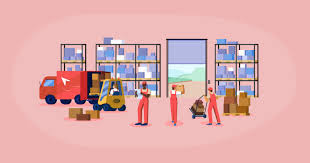Choosing an ecommerce logistics provider is a crucial decision that has a direct impact on your delivery lead times, customer service, and ultimately your brand reputation. With increased customer expectations and increasing competition in the internet economy, it’s essential to partner with a logistics firm that not only warehouses and picks up your products efficiently but also does its share to long-term business success. This article will help you choose the most crucial parameters to remember when selecting the optimal warehousing & fulfillment for your ecommerce business.
What is an Ecommerce Warehouse?
An ecommerce warehouse is a storage facility that is specifically designed for online retailers. As compared to general storage facilities, ecommerce warehouses are built to handle high-speed inventory, handling enormous volumes of orders, and handling returns. The warehouses are generally fitted with the latest technology and shipping carriers to maximise the end-to-end warehousing & fulfillment process.
How to Select an Ecommerce Warehouse for Your Online Store?
In shortlisting an ecommerce logistics company, it’s not merely a matter of who can stock your products. It’s about getting someone who knows ecommerce operations and will grow with you.
1. Location
Being near your customers is crucial. Having a warehouse near your main customer hub can cut down on delivery time and shipping expenses radically. Select a provider that provides distributed warehousing for quicker delivery to customers.
2. Accessibility
Your logistics partner has to provide free access to your inventory information and enable easy onboarding. Whether onboarding a new SKU or changing stock levels, free access should never be negotiable.
3. Warehousing Solutions Integrated
One of the ecommerce logistics service providers that should be depended upon should offer warehousing integrated and enabling inventory receiving, quality inspection, storage optimisation, and free stock movement among different nodes. This is vital in reducing overhead and making the product available conveniently.
4. Integrated Fulfillment Solutions
Fulfillment is more than order delivery. It’s picking, packing, labelling, and handling last-mile delivery partners. Warehousing & fulfillment integration ensures every order is handled correctly and sent on time.
5. Technology
Automation and visibility are business essentials in ecommerce logistics. Choose a provider with a solid technology foundation—order tracking, inventory forecasting, real-time dashboards, and automated reconciliation must be routine business processes.
6. Right for Business Size
Whether you are an enterprise or D2C business, your logistics company needs to have scalable solutions. Your ecommerce logistics solution provider needs to scale with your order volume, seasonal demand, and expanding product lines.
7. Warehouse and Fulfillment Operations Experience
Identify a partner with experience in ecommerce warehousing & fulfillment. They should have an operations process that is scalable with your customer demand for delivery time and packaging quantities.
8. Efficiency and Productivity
High pick-and-pack accuracy levels, lowest cycle times on low-order volumes, and fewer returns for order packing errors are all signs of an effective third-party logistics provider. All of these have direct implications on profitability and customer satisfaction.
9. Membership in Professional Associations
Suppliers that are members of ecommerce or logistics organisations are likely to follow industry best practices. It is an excellent testimony to their credibility and best practices.
10. Protection and Security
Warehouses should be secured and insured. Your products are safeguarded securely from theft, destruction, and climatic factors. Ask for CCTV surveillance, fire alarms, and employee screening processes.
Eshopbox: Ecommerce Logistics Solutions.
Eshopbox is developed as an end-to-end ecommerce logistics service provider, tailored specifically for next-generation ecommerce businesses. Distributed warehousing & fulfillment centres in India are offered by it so sellers can keep inventory close to customers and save on shipping time.
What distinguishes Eshopbox is its seamless embedding of technology. Brands can embed stock across channels like Shopify, Amazon, Flipkart, etc. There is accurate real-time tracking of orders and stock with robust visibility and control. From automated order handling to intelligent routing and personalised packaging, Eshopbox provides a luxury customer experience with every use.
Apart from this, Eshopbox enables brands to grow effortlessly by handling complex processes like returns, payment reconciliation, and performance analysis at a single location. Their facilities are designed for velocity, accuracy, and security, and they are the partner of choice in the growth of ecommerce businesses.
Conclusion
Picking the best-suited ecommerce logistics provider is an ecommerce success factor. Look at providers based on location, technical ability, scalability, and accuracy in fulfilling orders. Prefer those who have offered warehousing & fulfillment services driven by strong technology and successful ecommerce experience.
Schedule a demo with Eshopbox today and discover how their warehousing & fulfillment capabilities can turn your ecommerce business from a headache into a market leader.
Choosing an ecommerce logistics provider is a crucial decision that has a direct impact on your delivery lead times, customer service, and ultimately your brand reputation. With increased customer expectations and increasing competition in the internet economy, it’s essential to partner with a logistics firm that not only warehouses and picks up your products efficiently but also does its share to long-term business success.
